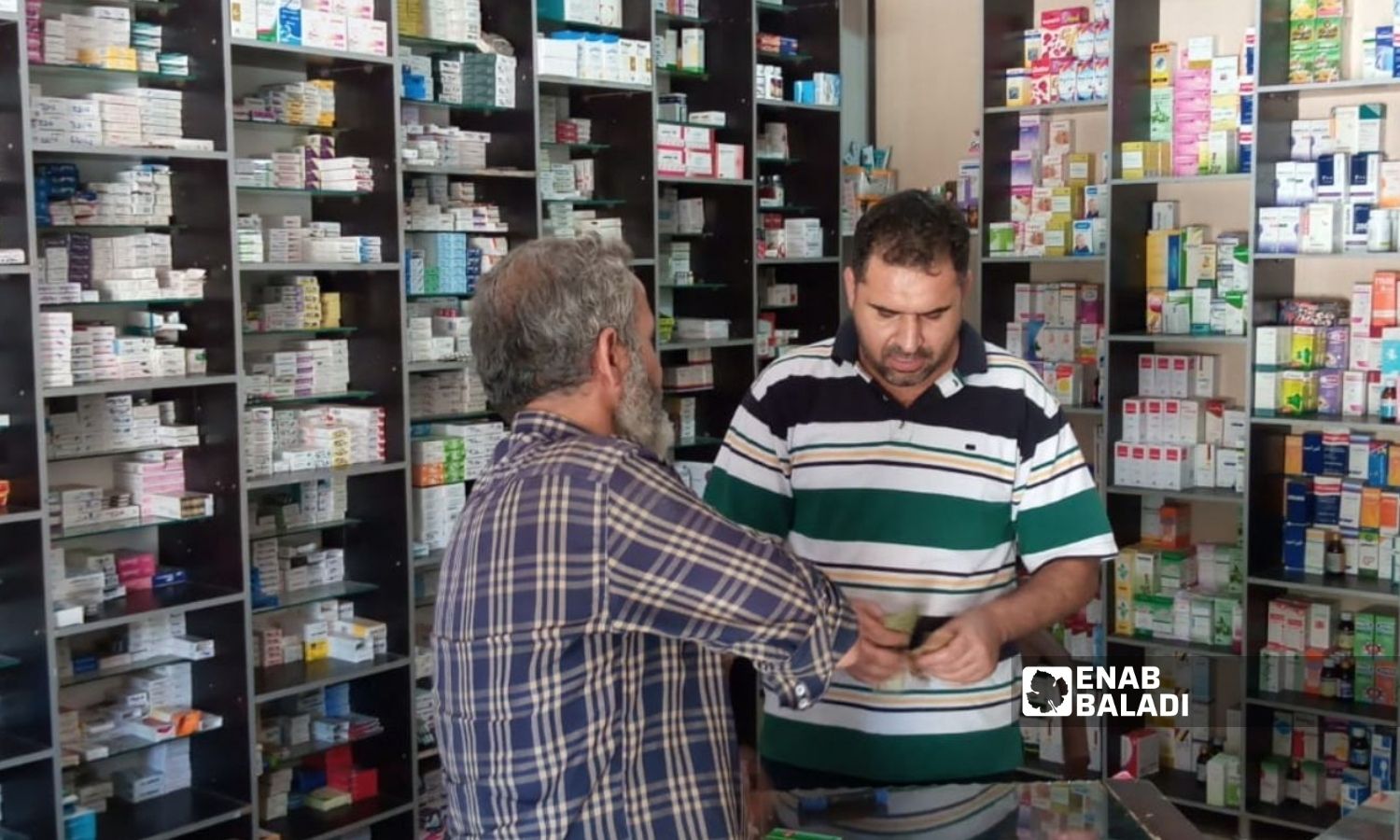



Enab Baladi – Huda al-Kulaib
The private health sector in Idlib, northwest Syria, has witnessed a significant increase in the price of medical examinations, which almost doubled, in return for the low income of the majority of the region’s residents, which weakens their ability to pay for the diagnosis.
The high cost of examinations prompted many to search for alternatives centered around free medical consultations through social media, whether from specialists or others, in addition to relying on pharmacies as a primary reference and to get a prescription.
Fadwa al-Subouh, 42, sees social media and the YouTube platform, in particular, as a free alternative to seeking treatment due to the sharp increase in medical consultation fees, which exceed her capacity with the deteriorating living conditions.
Al-Sabouh told Enab Baladi that she is trying to save medical diagnosis fees for basic needs such as food and house rent, and she also uses the expertise of pharmacists to diagnose any symptoms and to obtain medication directly.
According to Ahmed al-Hassoun, 34, a daily worker, the cost of a medical diagnosis has recently reached 60 Turkish liras (about 3.5 US dollars), after it was 30 liras four months ago, and it does not stop there, as it is often accompanied by medical analyzes and x-rays, the cost of which also may reach 500 Turkish liras (about 27 US dollars).
Al-Hassoun, who rarely resorts to doctors, gets 50 Turkish liras (about 3 USD) a day only for his day-to-day work, a low wage that cannot bear the costs of diagnostic and medical tests, which are equivalent to a third of his monthly income, if he works without interruption, he told Enab Baladi.
Al-Hassoun depends on herbal medicine by looking at a variety of mixtures from the Internet, which relieves the most common pain, such as joint, back, kidney, stomach, and pharynx pain, noting that solutions on the Internet sometimes dispense with the doctor.
For her part, the 33-year-old IDP Sabreen al-Burhan tries to access the Internet for a detailed explanation of specific symptoms and how to treat them at home without the need to consult a doctor in most cases.
Al-Burhan relies on the Internet to get treatment for her children for common illnesses, such as colic, cold, and flu.
“I often get results that are good, which removes the burden of going to private clinics, a place that does not distinguish between the poor and the rich,” she told Enab Baladi.
“With the presence of the pharmacist, the problem is solved,” with this phrase, Sobhia Raji, in her fifties, expressed the importance of the pharmacist’s work in the IDP camps in northern Idlib region, in addition to the camps’ remoteness from the cities, and the difficulty of accessing medical services, which are often expensive, in return for poor financial capabilities.
According to what she told Enab Baladi, Raji suffers from hypertension and diabetes, but she does not need to see a doctor with the help of a pharmacist who prescribes the medication she needs on an ongoing basis.
Free medical services in public hospitals require complicated procedures related to pre-registration for a free examination and long hours of waiting between patient queues, Raji added.
“A person can imagine the suffering of poor patients and what they can go through to reach a mere medical examination, from the long and exhausting wait to their bearing the burden of paying additional expenses in exchange for securing transportation from their remote camps to the free medical centers,” Raji says, describing the suffering of the IDPs.
Duraid al-Rahmoun, primary health care principal in the Idlib Health Directorate, told Enab Baladi that the directorate does not interfere in setting the diagnostic fees, but it is set by the Doctors Syndicate in Idlib.
He explained that the latter depends on setting the fees on the degree of specialization and experience, and with the approval of all doctors as the highest value, and the doctor is free to reduce it.
Dr. Malik Atwa, head of the Doctors Syndicate, refused to give any statement to Enab Baladi about the mechanism for setting the fees and the possibility of reducing them in proportion to the average income of the residents.
The Sarmada-based ophthalmologist Hamido Yassin al-Hamido warned that merely searching for symptoms on the Internet, and resorting to pharmacies to obtain superficial consultations, is often harmful to patients, as some are unable to adequately explain their medical problems.
Al-Hamido told Enab Baladi that “online treatment and pharmacies can be an alternative in common disease cases that do not require a doctor’s visit, except in overlapping cases that require a careful diagnosis.
The ophthalmologist stated that he observed many medical errors caused by unspecialized pharmacists, who prescribed inappropriate medicines to some patients, which worsened their condition.
The percentage of families under the poverty line reached 84%, considering basic prices and income sources, according to the latest report of the Syrian Response Coordination Group (SRCG) on the index of hunger, poverty, and families’ economic costs in northwestern Syria.
Families under the hunger line amounted to 36% of the total families below the poverty line due to several considerations, the most important of which are the number of working family members and currency fluctuations (Turkish and Syrian) against the dollar.
The local relief group stated that calculating the cost of living for a family of four within the minimum limits, without relying on humanitarian aid, is 3,165 Turkish liras (about 175 US dollars).
The poverty limit for one family is 228 US dollars, equivalent to 4,245 Turkish liras, based on international classifications of the poverty line, which is 1.9 USD per person per day.
The response team categorizes all the residents of the camps in the region below the poverty line, and 18% of the IDPs are classified under the hunger line.
if you think the article contain wrong information or you have additional details Send Correction